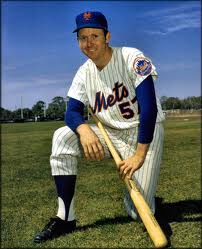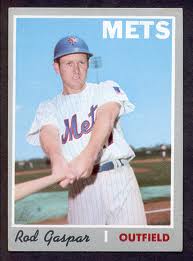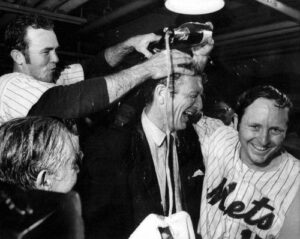By Mark Ellis —

He was part of the “Miracle Mets,” the baseball team that overcame significant odds to win the 1969 World Series. The team’s improbable victory became part of American folklore. Even George Burns, who played God in the movie “Oh, God!” made the crack that the last miracle he performed was the 1969 Mets.
“We were 100 to one underdogs,” says Rod Gaspar, who as a rookie outfielder in 1969, chased his ‘field of dreams’ all the way to the World Series. “We played clutch ball, good defense, and didn’t make mistakes,” he notes.
At almost every position, the Baltimore Orioles had a superior team – on paper. Baltimore had Hall of Famers like Frank Robinson, Jim Palmer, and Brooks Robinson. Other greats on the team included Boog Powell, and pitchers Mike Cuellar and Dave McNally.

“In every position they were better than the New York Mets, but you don’t win games on paper,” Gaspar notes. He credits the Mets’ manager, Gil Hodges, for galvanizing his players into a finely tuned machine. “Gil did a super job; he ran it like a business. He was so organized; we all knew what we had to do.”
Gaspar admits that anger fueled his intense drive to succeed in sports. “I was born ticked-off,” he says. A late bloomer, he was five feet, two inches tall at 16, which led to feelings of inferiority. “I had a little man complex. I was competing against guys that were a lot bigger than me, so that drove me.”
His athletic prowess wasn’t noteworthy in high school, but began to emerge in college. Coach Joe Hicks at Long Beach City College taught him how to “think” the game. He began to appreciate the fact that on every pitch, something different can happen on the field. “I’ve been watching baseball for 60 years and I still see things I’ve never seen.”
In 1967, the Mets drafted Gaspar to play in the AA league. “I was told as soon as I got there I would be playing,” he recalls. “That was the first lie I heard in baseball,” he laughs. The following year he hit .310, good enough for the Mets to give him a shot at making the big league club in 1969.
Gaspar had grown to six feet, 155 pounds, and was very confident in his baseball abilities. He went into spring training in 1969 certain he would make the team, even though he was competing against guys who had been in the majors for years.
His tenacious play and cocky attitude helped him earn a spot, but Gaspar proceeded to ride the bench in spring training. “I was thinking I could beat these other guys out, but they weren’t playing me and I was ticked,” he says. Later, he found out the Mets’ brass had planned on him playing AAA ball that year.
Hitting streak
But then something unexpected happened. Outfielder Art Shamsky hurt his back in spring training. With the Mets set for a road trip, Gil Hodges called on Gaspar and proceeded to start him. “I went on a 14-game hitting streak,” Gaspar recalls. He awakened to every rookie’s dream – as the 1969 season opened, he was in right field batting second in the line-up.
As an expansion team in 1962, the Mets had more losses than any other team in baseball history. During their first seven seasons, they never finished higher than ninth place in their league – out of 10 teams.
The first half of their 1969 season was uninspired – they won less than half their games. After their 42nd game, the season completely turned around, and they had 82 wins and 39 losses during the rest of the year.
In mid-August, the Mets were in third place, nine games behind the Cubs in their division. Then the Mets won 39 of their last 50 games to finish the year at 100-62 – one of the greatest turnarounds in baseball history.
Before the start of the World Series, Gaspar made a bold pronouncement to radio announcer Lindsey Nelson: his team would win the series in four straight. “It was my first year in the big leagues and I was young, stupid, and immature — mouthing-off,” he recalls.
Orioles star Frank Robinson got wind of the remark and asked, “Who in the hell is Ron Gaspar? Who is this punk guy?”
1969 World Series
In game one, Cy Young award winner Tom Seaver – playing for the Mets — pitched against Mike Cuellar. The Mets lost that one, 4-1, and it looked like Gaspar’s prediction was up in smoke.
The next day, the Mets won at Memorial Stadium in Baltimore 2-1 and the series moved to New York.
At Shea Stadium, the Mets blanked the Orioles 5-0 in the third game, after Nolan Ryan came in as a reliever and pitched a shut-out in the last two innings. It was Nolan Ryan’s only World Series appearance in his career.
Suddenly, the Mets were up 2-1, against everyone’s expectations.
In the fourth game, the Mets were ahead 1-0 in the ninth inning. With Orioles runners on first and third bases and one out, “Ron Swoboda made the greatest outfield catch and play I’ve ever seen,” Gaspar recalls, after he dove for a line drive by Brooks Robinson. The tying run scored, but “the catch,” as it became known saved at least one run and possibly two.
With the score tied 1-1, Catcher Jerry Grote led off the inning for the Mets with a double. Gaspar was called to pinch-run for Grote. “There were 57,000 people going crazy,” he recalls. On the following play, Al Weiss was intentionally walked.
Then J.C. Martin bunted toward Orioles pitcher Pete Richert. Richert ran forward, picked up the ball to throw Martin out at first base, but he hit the runner on the wrist and the ball bounced away.
“I’m running to third,” Gaspar recalls, “and my back is to the play. As I rounded third, our third base coach yelled at me to go, but I couldn’t hear him because of the noise in the stadium. I happened to look over my shoulder and saw the ball rolling toward second base.”
Despite the crowd noise and confusion, Gaspar took off for home base. He scored the winning run of game four, a moment to cherish. Tom Seaver, who had an outstanding pitching performance that day, was the first one to greet Gaspar at home plate. This was Seaver’s only World Series win in his illustrious 19-year career.
Gaspar’s winning score was controversial, because replays later showed that Martin was running inside the baseline and could have been called for interference. Umpires ruled in the Mets’ favor, because they decided Martin did not intentionally interfere.
The ‘Miracle Mets’ won the fifth and final game 5-3 and the celebration began. New York Mayor John Lindsay was in the locker room and

yelled at Gaspar, “You said you’d win it in four straight…”
“I didn’t say which four,” Gaspar replied. To his credit, Lindsay had attached himself to the team that year. “Lindsey was not the most popular guy in the world, but he hooked up with the Mets,” Gaspar recalls. “We talked at his rallies. I believe we got him elected.”
After the 1969 season, Gaspar coasted and let himself get out of shape. When he reported for spring training the next year, he had trouble hitting the ball and was dropping fly balls. One year after he made it to the majors he was cut and sent back to the minors.
This major disappointment had a silver lining. The day after he was cut Gaspar met his future wife, Sheridan. “I didn’t think I would ever get married,” he says. “I never really had any girlfriends. Nobody would put up with me.”
Even though Gaspar was not a Christian at the time, he now sees God’s providence at work. “If I hadn’t been cut from the team, I probably wouldn’t have met Sheridan.”
After he got himself back in shape, Gaspar led the AAA league, hitting .370 for the Tidewater Tides. As a result, he was called up to the Mets for the remainder of the 1970 season. Then the Mets traded him to the San Diego Padres, where he played two seasons.
A new life awaits
Gaspar retired from baseball in 1976 and went into business, selling life insurance. “I was a jock off the street and didn’t know much about money or business,” he admits. “All I knew was how to throw, catch, and hit a ball.”
Some guys in the office invited him to a Bible study that met every Friday morning. “I’d never read a Bible,” he confesses. He didn’t know an epistle from an apostle.
“On Christmas morning, 1976, the Holy Spirit convicted me,” he recalls. “It just hit me. I believed every word in the Bible even though I’d never read it.”
That morning he invited Jesus Christ to come into his heart as his Lord and Savior. A month later, a pastor visited from Mission Hills Baptist Church and led his wife, Sheridan, to the Lord.
In the early 1980s, Gaspar went through a rough season financially. “We had a house in Mission Viejo with a second and third mortgage on it,” he recalls. “Our two credit cards were maxed-out.” They had three kids with a fourth on the way.
“I was in the business of helping people save money and I realized I was a big-time hypocite,” he admits. During this low point in his life, Gaspar drew even closer to God. He got up early in the morning for personal devotionals and began to memorize large chunks of Scripture – entire chapters in Romans and other books.
Then God brought a man named Guy Baker into his life. Baker – also a Christian – was a top producer in the insurance business. “He showed me how to invest in people, to take the focus off myself and put it on helping others.”
Gaspar recognized that Jesus came to help and serve other people, and this became the key to turning his life and business around.
Personal tragedy
One of the greatest personal heartbreaks for Sheridan and Rod and their family came in 1992, when they lost their fourth child, David, to leukemia. He was only 9-years-old, and Gaspar still breaks up when he thinks about the loss.
“People don’t understand who haven’t lost a child,” he says. “It is devastating. You can’t explain it and there’s nothing anybody can say to you.”
After their tragic loss, Gaspar stopped coaching Little League. For over 10 years, he couldn’t give his testimony in public, because he would break down.
The biblical story of David’s loss of his son after his sin with Bathsheba is meaningful to him, because of King David’s revelation that he would see his son one day in heaven. “My boy can’t come to me, but I know I’ll be with him some day.”
“I think about my David all the time. He had a rare form of leukemia. He lasted about two and a half months before he died. He probably should have lasted only a week but he was such a fighter. He never quit trying to whip the disease. I miss him so much,” he says. “The spirit of David is what drives me.”
Gaspar is still very competitive on the handball court, playing in national handball tournaments. “I’m more competitive now at 65 then when I played in the major leagues. That is because of Jesus Christ,” he says.
“Jesus was amazing when He was on the cross,” Gaspar observes. “There is no way we can comprehend the mental, physical, and spiritual abuse he took and He never said a word against His accusers…the toughest person ever. He never quit. How could I ever quit on anybody?”
If you want to know God personally, go here



